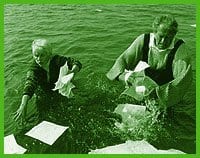Michel Marc Bouchard owes the inspiration for his latest play to meeting his mother’s writing circle.
Bouchard’s play Written On Water, beginning a run at the National Arts Centre later this month, is also about writing, and the emotional and creative processes involved.
When his mother invited him to speak to her writing group in Alma, Lac St-Jean, where he grew up, Bouchard found the experience very moving.
“They ask old people to write their archives,” Bouchard says. “I appeared in front of them as a writer with the freedom of fiction, but they were in the process of the real.
“What really moved me was that they touched something sacred – writing and the organization and selection of their memory. It was a powerful experience. In a way, it was young, this process, so enthusiastic, so naive. It was like they were actually revisiting their lives.”
After Bouchard spoke to the circle about writing, he discovered a new source of inspiration. He sat down to write the play loosely based on such a writing group.
Written on Water is about a village dealing with the aftermath of a great flood. All the inhabitants are senior citizens. The children have grown up and left for other work, except for Samuel, the protagonist, who has formed a writing circle with most of the village. They record what they’ve seen and done, the history of the village, and subjects as seemingly innocuous as the arrival of the first microwave or mini-skirt. After the flood, Samuel tries to get the writing circle to rewrite and, in effect, reinvent their stories.
Bouchard describes five characters who are mourning more for their unique writing circle than the devastated township. With a gymnasium as the main setting – where the writing circle meets – a nameless town and no recognizable cultural references, Bouchard tried instead to delve into roots.
Bouchard also uses the play to explore the nature of love, and how it can grown out of such creativity as writing.
“Two old ladies are in love for a while,” says Bouchard. “They have to decide whether to leave the village or if one of the two lovers will stay with her brothers. Their relationship is really secret – and with a beautiful kiss on stage.”
Bouchard says the play is not a fact-based documentary about his mother’s writing circle, more of a rendering.
“I don’t recreate the characters that were there,” Bouchard says. “In the story, there is a huge flood, but for a few characters, the most important thing is to save the manuscripts – not save the house!”
It was that look at the importance of the written word that appealed so deeply to director Micheline Chevrier, who is helming NAC’s production.
“It’s about seeing how anyone can write down their lives,” she says. “How writing can make things important that otherwise seem unimportant. The great power in the word – salvation, redemption.
“What do you do when you get to a certain age?” Chevrier says. “Do you reinvent it so you can nurture your illusions? Or is it the past?”
Chevrier compares the play’s fictional town to real-life towns where kids grow up, move away for school and stay in the big city to make a living.
“This is happening in small villages all over Canada, because there’s no work,” says Chevrier. “Is it important to remember those villages? Those stories?”
She read an earlier French version after CanStage commissioned Bouchard to write it a year and a half ago. But when Written on Water premiered in French last February in Montreal, the media gave the production bad reviews across the board.
Chevrier, however, considers Written On Water challenging and beautiful, with an appealing mixture of material.
“It blends poetry in expressing ordinary life,” Chevrier says. “The language is heightened, while the plight of the characters is very ordinary.”
Chevrier had also followed Bouchard’s work closely. His numerous accomplishments include L’histoire de l’oie (The Tale of Teeka), which won the National Arts Centre Award and the Governor-General’s Award. John Greyson directed the film adaptation of Bouchard’s play, Lilies, which won a Genie Award for Best Film and several prizes at film festivals in Europe and the United States.
“He’s got an enormous heart,” Chevrier said. “His characters are beautiful. He really sees them. That really draws me in. Nobody writes worlds like him.”
Chevrier herself has directed theatre for about 20 years and was artistic director of the Great Canadian Theatre Company for five. With credits that span plays by Noel Coward, Chekhov, Moliere and Tremblay, Chevrier’s main criterion is simple.
“A great story,” Chevrier says. “That sounds obvious, but isn’t. Not every play has a great story. The play should be smarter than me. Those plays really excite me.”
WRITTEN ON WATER.
By Michel Marc Bouchard.
Translated by Linda Gaboriau.
Directed by Micheline Chevrier.
Wed, Feb 25 to Sat, Mar 13.
National Arts Centre.
7:30pm weekdays.
2pm matinees on the weekend.

 Why you can trust Xtra
Why you can trust Xtra


